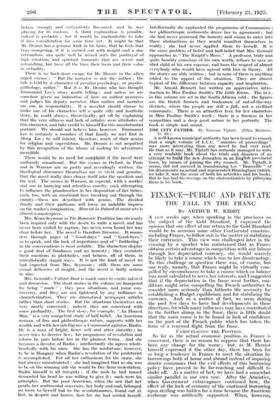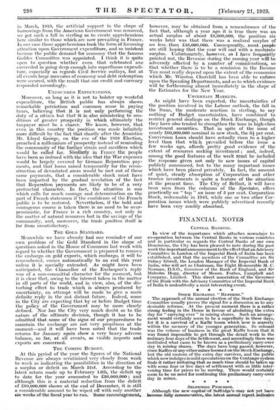FINANCE PUBLIC AND PRIVATE
THE FALL IN THE FRANC
By ARTHUR W. KIDDY A FEW weeks ago, when speaking in the provinces on the subject of the Gold Standard, I expressed the opinion that one effect of our return to the Gold Standard would be to occasion some other Continental countries, including France, to follow Sinfin the matter of stabilizing their currencies. This view was challenged later in the evening by a speaker - Who maintained that- as Fiance obtains certain advantages in competition with our labour through her depreciated currency, she would , scarcely, be likely to take a course which was to her disadvantage. To this challenge or question there was, of course, but one -reply, namely, that Fiance might be virtually com- pelled by circumstances to take a course which on balance was most calculated to serve her interests, and I suggested that if the depreciation in the franc went further, con- ditions -might arise compelling the French authorities to consider more seriously than hitherto the necessity for establishing a Budget equilibrium and for stabilizing the currency. -And, as a matter of fact, we seem during the past few days to have had developments in these directions, for while many influences may have contributed to the further slump in the franc; there is little doubt that the main cause is to be found in lack of confidence on the part of the French public which has taken the form of a renewed flight from the franc.
CAMOUFLAGING THE POSITION.
So far as the actual economic position in France is concerned, there is no reason to suppose that there has been any change for - the worse ; but, as M. Herriot himself expressed it the other day, there has been for so long a tendency in France to meet the situation by borrowings both at home and abroad instead of imposing drastic economies that the evil effects of this borrowing policy have proved : to be far-reaching and difficult to shake off. As a matter of fact, we have had -a somewhat similar parallel in our own case. After the Armistice,, when Government extravagance continued here, the effect of the lack of economy of the continued borrowing upon sterling-was hidden for a time because the American' - exchange • was artificially supported; When, however, in March, 1919, the artificial support in the shape of borrowings from the American Government was removed, we got such a fall in sterling as to create apprehensions here similar to those which are now prevailing in France. In our case those apprehensions took the form of focussing attention upon Government expenditure, and so insistent became the public demand for economy that the famous Geddes Committee was appointed. I think it is quite open to question whether even that celebrated axe succeeded in going deep enough into superfluous expendi- ture, especially as regards Civil Service outlays, but at all events large measures of economy and debt redemption were secured, with the result that our credit and currency responded accordingly.
UNFOUNDED EXPECTATIONS.
Moreover, so long as it is not to bolster up wasteful expenditure, the British public has always shown remarkable patriotism and common sense in paying taxes, believing that it is not only performing the duty of a citizen but that it is • also ministering to con- ditions of greater prosperity in which ultimately the taxpayer must be a sharer. We know, however that even in this country the position was made infinitely more difficult by the fact that shortly after the Armistice Mr. Lloyd George, cm the eve of the 1918 Election, preached a millennium of prosperity instead of reminding the community of the further strain and sacrifices which would be called for. Similarly in France the people have been so imbued with the idea that the War expenses would be largely covered by German Reparation pay- ments, and that loans raised temporarily for the recon- struction of devastated areas would be met out of these same payments, that a considerable shock must have been imparted by the gradual revelation of the fact that Reparation payments are likely to be of a very protracted character. In fact, the situation is one which calls for much courage and determination on the part of French statesmen if the- confidence of the French public is to be restored. .Nevertheless, if the bold and courageous course is taken there is no need to be -over- pessimistic, for France is a rich country, not only in the matter of natural resources but in the savings of the community, and, moreover, the trade position itself is far from unsatisfactory.
THE GOLD STANDARD.
Meanwhile we have already had one reminder of our own problem of the Gold Standard in the shape of questions asked in the. Rouse of Commons last week with regard to whether the Government is prepared to remove the embargo on gold exports, which embargo, it will be remembered, comes automatically to an end this year unless it is specially extended. As might have been anticipated, the Chancellor of the Exchequer's reply was of a non-committal character for the moment, but it is clear that, owing to the interest taken in the matter in all parts of the world, and in view, also, of the dis- turbing effect to trade which is always produced by uncertainty, an attempt will be made to give a more definite reply in the not distant future. Indeed, some in the City are expecting that by or before Budget time the policy of the Government may be more clearly defined. Nor has the City very much doubt as to the nature of the ultimate decision, though it has to be admitted that some of the signs of our preparedness to maintain the exchange are not very propitious at the moment—and it will have been noted that the trade returns for January again show a very heavy adverse balance, so far, at all events, as visible imports and exports are concerned.
THE COMING BUDGET.
At this period of the year the figures of the National Revenue are always scrutinized very closely from week to week as indicating the possibilities in the direction of a surplus or deficit on March 31st. According to the latest return made up to February 14th, the deficit up to date for the year amounted to L36,000,000 ; and although this is a material reduction from the deficit of 189,000,000 shown at the. end of December, it is still a considerable amount to be wiped off with only another six weeks of the fiscal year to run. Some encoirtagement, however, may be obtained from a remembrance of the fact that, although a year ago it is true there was an actual surplus of about £8,000,000, the position six weeks later was that there was a realized surplus of no less _than L48,000,000. Consequently, most people are still 'hoping that the year will end with a moderate surplus. Unfortunately, however, as I have frequently pointed but, the Revenue during the coming year will be adversely affected by a number , of considerations, so that whether there is to le a remission in the rncome Tax must really depend upon the extent of the economies which Mr. Winston Churchill has been able to enforce upon the Spending Departments, and as to which evidence will be forthcoming almost immediately in the shape of the Estimates for the New Year.
UNCERTAIN MARKETS.
As might have been expected, the uncertainties of the position involved in the Labour outlook, the fall in the franc, the moderate reaction in sterling, to say nothing of Budget uncertainties, have combined to restrict general dealings on the Stock Exchange, though they have also tended to strengthen the tone in high-class investment securities- That. in spite of the issue of nearly 160,000,000 nominal in new stock, the 84 per cent. Conversion Loan should have actually risen to a higher level than that which prevailed before the issue a few weeks ago, affords pretty good evidence of the extent of resources seeking investment ; and, indeed, among the good features • of the week must be included the response• given not only to new issues of capital publicly announced, but to the many important issues which have been placed privately. In fact, the amount of quiet, steady absorption of Corporation and other trustee investments is quite a feature of the situation at the present time. The City of Belfast, it will have been seen from the columns of the Spectator, offers practically on "tap " an issue of 5 per cent. Corporation Stock, redeemable in 1945, while one or two other Cor- poration issues which were publicly advertised recently have been very readily absorbed.











































 Previous page
Previous page